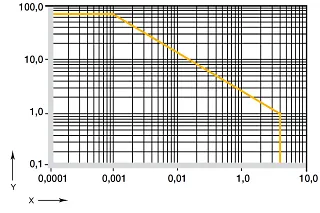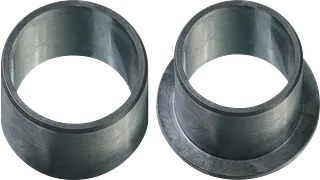Change Language :
iglidur® L500 - material data
The most important specifications at a glance
| Descriptive technical specifications | ||
|---|---|---|
| Wear resistance at +23°C | - 🟧 🟧 🟧 ⬜️ ⬜️ + | More information on wear resistance |
| Wear resistance at +90°C | - 🟧 🟧 🟧 🟧 ⬜️ + | |
| Wear resistance at +150°C | - 🟧 🟧 🟧 🟧 🟧 + | |
| Slide property | - 🟧 🟧 🟧 🟧 ⬜️ + | Coefficient of friction, dynamic, against steel: µ 0.08 - 0.15 |
| Wear resistance under water | - 🟧 🟧 🟧 🟧 ⬜️ + | |
| Media resistance | - 🟧 🟧 🟧 🟧 🟧 + | More information on media resistance |
| Resistant to edge pressures | - 🟧 🟧 🟧 ⬜️ ⬜️ + | |
| Resistant to shock and impact loads | - 🟧 🟧 🟧 ⬜️ ⬜️ + | |
| Dirt resistance | - 🟧 🟧 🟧 🟧 ⬜️ + |
Temperatures
iglidur L500 plain bearings can be used up to temperatures of +315°C in the short-term. An additional protection is required for temperatures above +135°C. At higher temperatures, the plain bearings may lose their press-fit and move inside the hole.
Temperatures, coefficient of thermal expansion
| min. application temperature | Upper application temperature, long-term | Upper application temperature, short-term | In addition secure axially from |
|---|---|---|---|
| -100°C | +250°C | +315°C | +135°C |
Permissible surface speeds
iglidur L500 has been developed precisely for high surface speeds at low loads. Due to the high temperature resistance of iglidur L500, the physical limit, which is given by the heating of the bearing, has been increased significantly. In addition, the very low wear allows high sliding distances to be achieved quickly at high circumferential speeds. The maximum speeds are shown in the table.
Surface speeds of different iglidur materials
| Maximum surface speeds [m/s] | Rotating | Oscillating | linear |
|---|---|---|---|
| Long-term | 4.0 | 1.5 | 5.0 |
| Short-term | 5.0 | 3.0 | 8.0 |
Permissible pv values

Diagram 01: Permissible pv value for iglidur L500 plain bearing in dry operation against a steel shaft, at +20°C, installed in a steel housing
X = surface speed [m/s]
Y = pressure [MPa]
pv value, max. (dry)
MPa · m/s
4.00
<a 0="[" 1="o" 2="b" 3="j" 4="e" 5="c" 6="t" 7=" " 8="O" 9="b" 10="j" 11="e" 12="c" 13="t" 14="]" href="/de-de/website/gleitlager/wiki/p-x-v-wert-und-schmierung" uuid="f16b1d8b-0ff1-4a28-951c-3fbeec74eafd" target="_self">Information on pv value and lubrication
Mechanical specifications
The compressive strength of iglidur L500 plain bearings decreases with increasing temperatures. Diagram 02 illustrates this relationship. The maximum recommended surface pressure represents a mechanical material parameter. Conclusions about the tribology cannot be drawn from this. Diagram 03 shows the elastic deformation of iglidur L500 under radial load. Under the maximum recommended surface pressure of 70MPa and at room temperature, the deformation is less than 2.5%. Plastic deformation can be neglected up to this value. However, this also depends on the duration of the impact.
Friction and wear
The very good coefficient of friction level of iglidur L500 in dry operation drops again significantly with speed. Diagram 04 shows this relationship on a steel shaft. The coefficient of friction also decreases with increasing load, especially in the range up to 20MPa (diagram 05).
Coefficient of friction against steel (Ra = 1μm, 50HRC):
| iglidur L500 | dry | Greases | Oil | Water |
|---|---|---|---|---|
| Coefficient of friction μ | 0.08 - 0.15 | 0.09 | 0.04 | 0.04 |
Shaft materials
Diagram 07 shows the result of a comparison test between iglidur L500 and a sintered bearing. The wear of the sintered bearing increases exponentially beyond 1.5m/s, while the iglidur L500 plain bearing can maintain an almost identical wear rate beyond 4m/s.
Humidity
The very low moisture absorption of 0.1% weight in a normal climate and 0.3% weight in maximum water absorption also enables continuous use in high humidity or in liquid media.
Weathering resistance
iglidur L500 plain bearings are permanently resistant to weathering. The material properties deteriorate only slightly. Any discolouration that may occur is only of a superficial nature.
Chemical resistance
All data at room temperature [+20 °C], + resistant 0 conditionally resistant - non-resistant
| Chemicals | Resistance |
|---|---|
| Alcohols | + |
| Greases, oils without additives | + |
| Hydrocarbons | + |
| Fuels | + |
| Strong alkalines | + |
| Strong acids | + |
| Diluted alkalines | + |
| Diluted acids | + |
Installation tolerances
iglidur L500 plain bearings are standard bearings for shafts with h-tolerance (recommended minimum h9). The bearings are designed for press-fit into a housing machined to a H7 tolerance. After installation in a housing with nominal dimensions, the inner diameter of the bearings with F10 tolerance adjusts automatically. For certain dimensions, the tolerance deviates from this depending on the wall thickness (see product range).
Important tolerances according to ISO 3547-1 after press-fit:
| Diameter d1 [mm] | Housing H7 [mm] | plain bearing F10 [mm] | Shaft h9 [mm] |
|---|---|---|---|
| up to 3 | +0.000 +0.010 | +0.006 +0.046 | -0.025 +0.000 |
| > 3 up to 6 | +0.000 +0.012 | +0.010 +0.058 | -0.030 +0.000 |
| > 6 up to 10 | +0.000 +0.015 | +0.013 +0.071 | -0.036 +0.000 |
| > 10 up to 18 | +0.000 +0.018 | +0.016 +0.086 | -0.043 +0.000 |
| > 18 up to 30 | +0.000 +0.021 | +0.020 +0.104 | -0.052 +0.000 |
| > 30 up to 50 | +0.000 +0.025 | +0.025 +0.125 | -0.062 +0.000 |
| >50 to 80 | +0.000 +0.030 | +0.030 +0.150 | -0.074 +0.000 |
| >80 to 120 | +0.000 +0.035 | +0.036 +0.176 | -0.087 +0.000 |
| > 120 up to 180 | +0.000 +0.040 | +0.043 +0.203 | +0.000 +0.100 |

Buy iglidur L500 products in the online shop
- Large selection of moulds and materials
- Available within 24 hours
- No minimum order value
- No minimum order quantity
Typical application areas
Consulting
I look forward to answering your questions

Shipping and consultation
In person
Monday to Friday: 8 am – 8 pm
Saturday: 8 am – 12 pm
Chat-Service
Monday to Friday: 8 am – 5 pm
WhatsApp-Service
Monday to Friday: 8 am – 5 pm







